September will be the beginning of our third year in Placerville, California
Thoroughly charmed by the mixed conifer forests, abundant water features, and small-town ambience, we chose the foothills of the eastern Sierra mountains as home for our family. It’s also where we established Camp One as a headquarters of sorts for the Dust and Tribe community.
The property sits on nearly 8 acres, a modest homestead ripe with possibility. When we got here, we imagined chickens, goats, and a big dog to protect them all. Among the first things we bought were fence pickets and, you absolutely guessed it, we actually painted them white. We were so caught up in the dream, we couldn’t keep from acting on the script. The white picket fence would go around the dog house we planned to build for our Anatolian Shepherd puppy en route from the working farm in Colorado where he was born. He’d spent the first eight weeks of his life with his working parents, imprinting on the livestock he would one day be tasked to protect.
Once he arrived, we learned very quickly that our design would not work for this dog. Leggy and already quite strong, he was about to get a lot bigger and a lot more powerful. The picket fence came down, ripped into scrap for future projects. But our dalliance with the American Dream lives on in the dog’s name.
We called him AD.
With the dog in place, we got our first bunch of chickens, along with the heartache that comes from knowing that some level of personal ignorance likely played a role in the death of a few innocent peepers. Even so, we were able to get most of that initial flock outside and into their coop, and although we’ve since lost several more to predation, we’ve still got three of our original birds. We’ve successfully added lots of new hens and even a couple of roosters and with all of that worked out we’ve got more than enough eggs for our family, al-hamdu lillah.
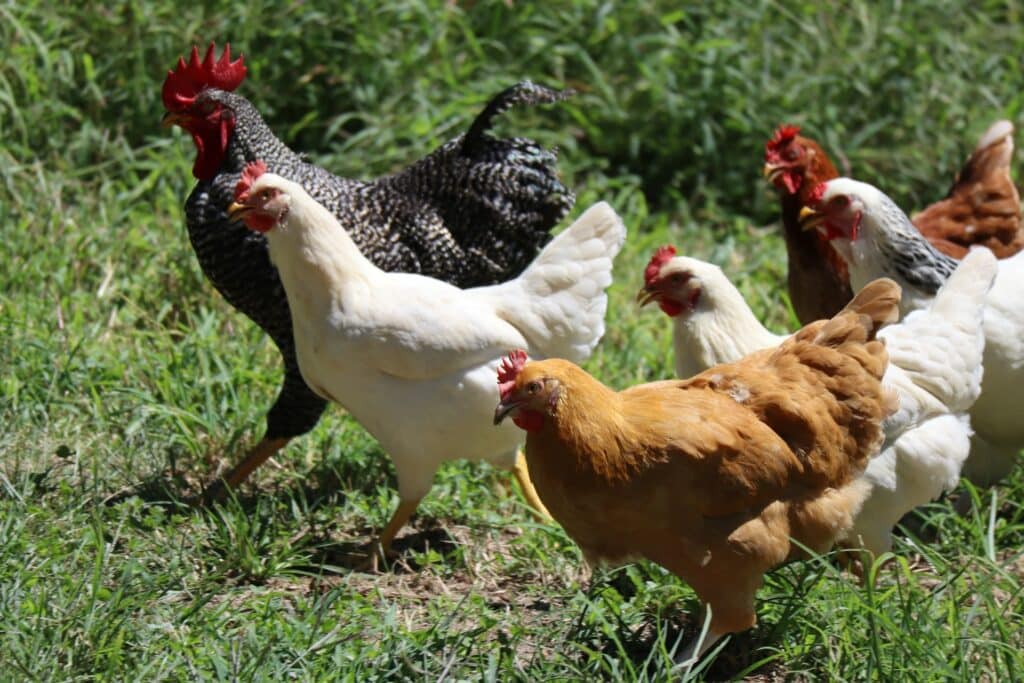
We got our first four goats from a local woman who told us that two of them were almost certainly pregnant. Goats usually birth two kids at a time, so within a few months our herd would double in size, and that’s exactly what happened. We got to watch all the babies being born in one of those moments where you just can’t believe life could be so generous. But it was, and our herd has thrived with the exception of one young male who died of bloat. We’ve since added four new babies for a total of eleven healthy animals, God be praised.
And all the while, even as we trained the dog and tended to the goats and the chickens, feeding them, grooming them, maintaining their water, shelter, and medications, we were working on a vegetable garden. After all, we had chicken eggs and now goat milk. All we needed were some potatoes, maybe some corn and beans, perhaps a bit of squash.
The inevitability of a self-sufficient lifestyle was within grasp.
How wrong we were.
Two years and six growing seasons later, we’ve had a handful of bean pods, a few tiny garlic bulbs, and what might be the two scrawniest sweet potatoes you ever did see.
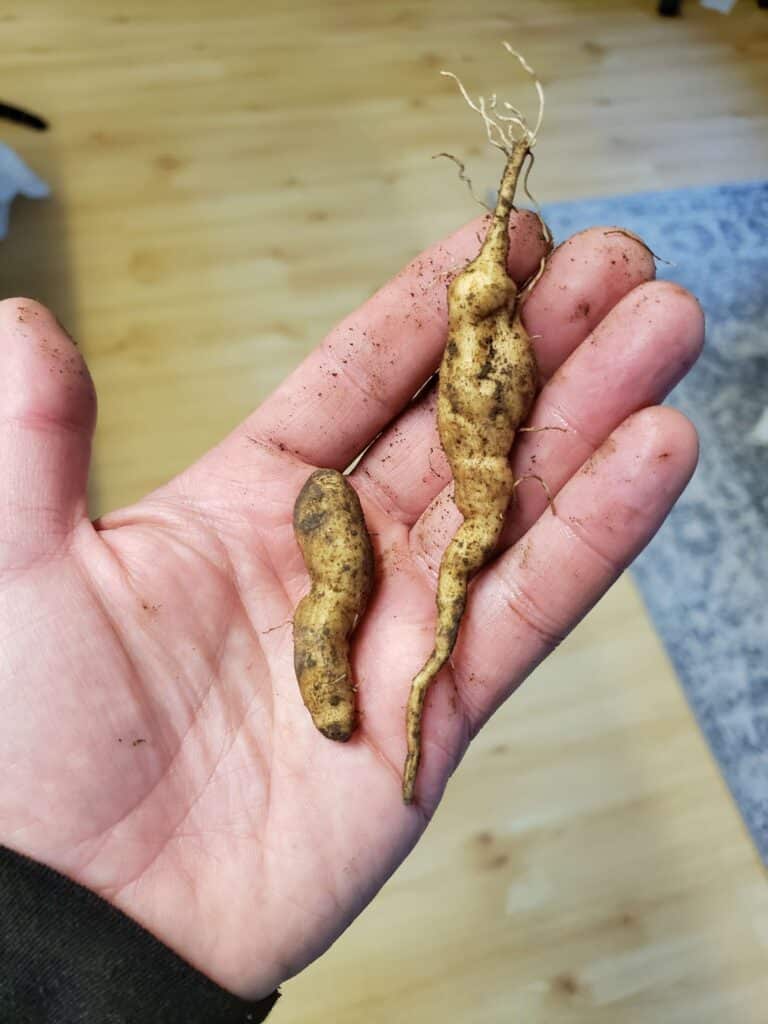
It’s not for lack of trying.
We got our soil tested. It’s real good. A nice spongy forest loam. No issues there. And we’ve got our own supply of mineral-rich well water, not some over-chlorinated municipal supply.
What we don’t have is experience gardening in the forest at elevation.
In our first attempts, our one-hundred square foot starting plot wasn’t fenced in and the deer ate everything. Once we got the fences up, the snow came and obliterated what was left. After that, we learned, way too late, that the forest is thirsty. The trees surrounding our plot have deep, deep roots that soak up every bit of moisture we put into the soil.
And while we don’t have growing experience up here, we do have a lot of compost, sort of. These are huge and growing piles of waste that we hope will become compost, but they don’t really do any of the dramatic and interesting things we see compost piles doing in our favorite homesteading videos. No steaming. No tea. Just a whole lot of kitchen scraps, fallen leaves, and hay and straw and wood chip animal bedding soiled with goat pellets, urine, and chicken manure. We heap it up, season after season without really knowing what to do other than . . . heap it up. After a few months, the piles shrink, so maybe something is happening. Or maybe it’s just compression. We don’t really know.
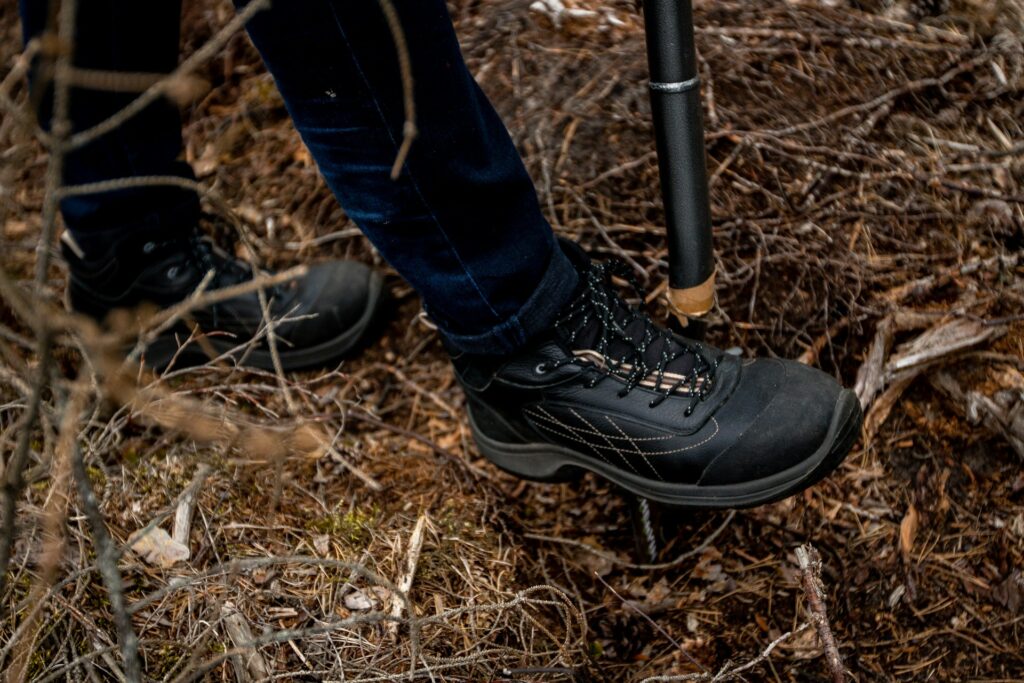
Meanwhile, we dug our plot deep, aerating the soil down to nearly 24 inches, breaking our backs and loosening the earth while clearing out rocks and roots. We did this every season because we want the roots of our vegetables to spread deep and wide without running into any interference. And we’d so hopefully plant in this lovingly turned soil only to get nothing.
This summer, out of exhaustion and desperation, we tried something different. We decided not to dig up the plot. We just took a spading fork and loosened things up a bit. We took great shovelfuls of our compost or compressed garbage or whatever it is, and layered it on top of the earth, two inches, four inches, six inches high. And as we did, we saw worms slithering around in the muck and old avocado seeds which had started to sprout.
We watered the plot and mushrooms popped out of everywhere. The whole plot was alive with organisms and into this grimy fertility we punched our seeds: corn and beans and squash. The indigenous people called them the three sisters and we do not need to fully understand the elegance of their symbiosis to take advantage of their legacy as a planting method with a 3000 year history in some of the harshest environments of the Americas.
Where we used to water for minutes and now we water for hours. All of that mulchy, semi-composted material really holds the moisture in place, giving our baby plants a chance at staying hydrated long after the pines have quenched their thirst. And for the first time ever we have something that looks like a vegetable garden!
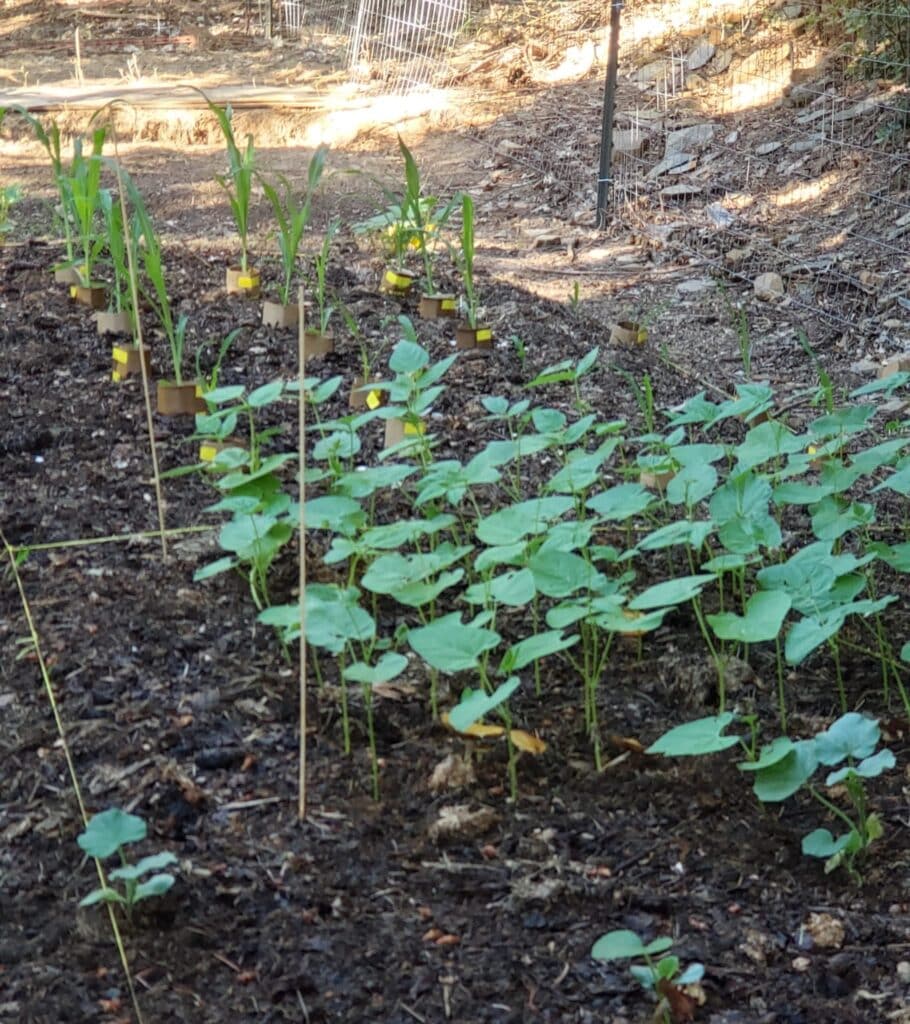
We’ve still got a long way to go, but things are looking better than they ever have. It would be inaccurate to say that we somehow just got it right this season. There’s more to it than that.
The previous five seasons where nothing happened no matter what we did, where we only met with disaster despite our best efforts, each of those five seasons brought us closer to the moment of growth we are currently experiencing. We may not have been able to produce vegetables, but we were conditioning both the soil and our selves. We were being taught by the deer and the cut worms and the shadows and the ice and the sunshine, being taught how to work with the elements, how to manage our frustrations, how to plan ahead, and finally, perhaps how to actually garden in the foothills.
I check on the garden twice daily. I marvel at the serpentine coyness of the corn and the proud boisterousness of the beans. The squash are slow and plodding, almost as if they are both bored and embarrassed by their companion plants. I had a role in starting the process, and I may yet have some responsibilities to manage in their growth and development, but the plants are mostly on their own now.
We are beginning to suspect that’s how it might be with a lot of things. Maybe we’re just kind of here to get things started. A lot of us are really invested in endings. I know I am. I like the security and closure of getting to the finish line, seeing all of my hard work pay off.
But what if the point is actually in just getting started? Maybe there is something to be said for simply having the confidence to know that, with a good intention and a solid work ethic, it doesn’t really matter what happens in the timeframe we’re permitted to indulge our aspiration. The work, if it has merit, if it has somehow become imbued with the hard-won lessons of toil and failure, the work will go on.
It will grow, on its own, maybe enough to one day feed the people.
Or maybe just enough to let the people know what needs to be corrected before they starve.
Leave a comment below for posterity or join us in the D&T Chautaqua Discord to discuss this post with other adventurous spirits from around the world.
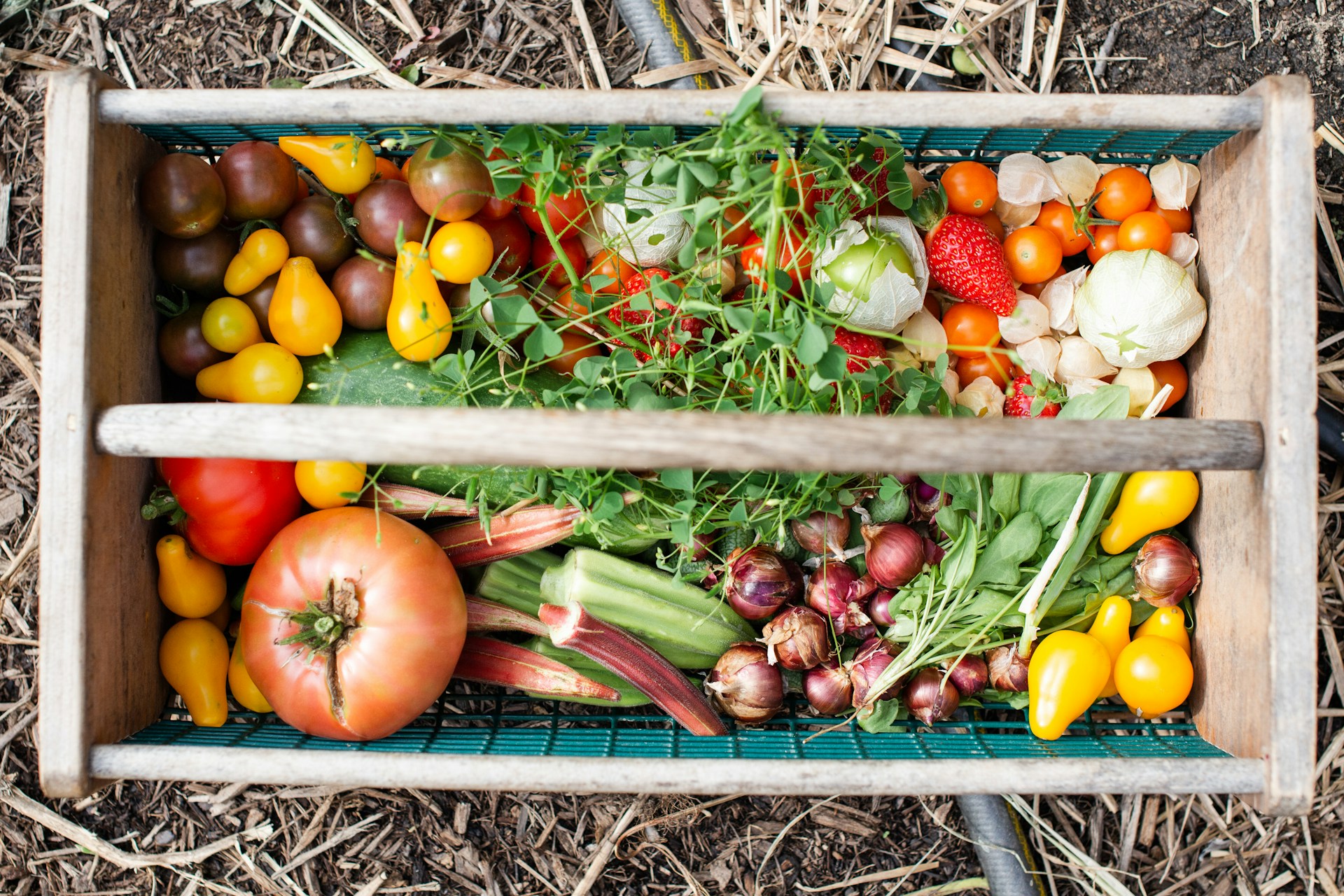
I’m really happy for you guys mashallah. You’re really learning through what comes. Mistakes or lessons or surprises were all just things that elevated you guys towards success. That’s such a hard lesson to learn sometimes, especially when you’re really deep in the hard stuff. Congrats on the incredible experience and knowledge you guys have gained.